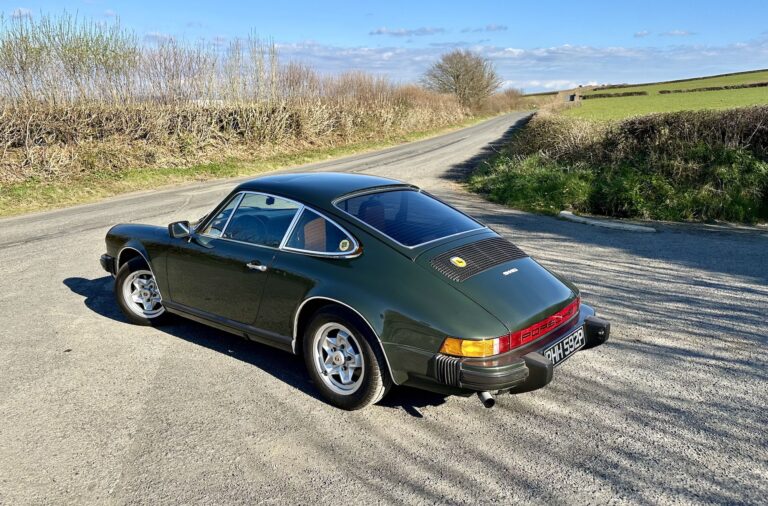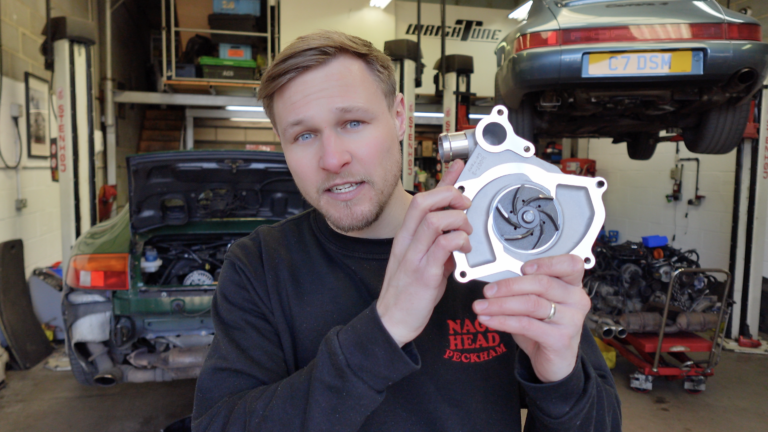What oil should I use?
There’s always been lots of opinions on the correct spec for 964 engine oil, and indeed there still is today. You’ll find reference to everything from 10w/40, but Porsche’s Classic branded fluid comes out at 10w/60 Classic fluid, if you prefer the manufacturer choice. Consider though, that Porsche’s Classic spec encompasses all engines from 3.0-litre onwards: it isn’t specific to the 964 motors.
Chris favours Mobil 3000 in 5w/40, which he says suits the engines well, and has never given them any oil-related engine problems. “Oil is like blood for the engine, and it has to do a lot in a 911” says Chris. “The main thing is to use a premium brand, of the correct spec oil”. Settle on one oil viscosity and, ideally, brand, then stick to it. During an oil change, there’s still a couple of litres of fluid left in the lines and cooler, which may not necessarily blend well with a different weight of oil.
How much to put in?
The two marks are separated by 1.75L on the dipstick. Don’t stress about it being dead-on maximum, as overfilling can cause problems. Instead, maintain a sensible level. “If you are topping up, add 100ml at a time, and keep checking it,” Chris adds. Indeed, during a service, Wrightune refill with a hair under what it needs, then work up slowly to a correct level. Note the gauge and dipstick don’t correlate to the same exact level: the dipstick shows a greater range. That’s why it can be useful to refer to the gauge, rather than risk an overfilling error if using the dipstick markings.
How often should you change oil if you aren’t using a 964?
Most 964s will be cosseted nowadays, only doing a few thousand miles per year – if that. But you should still change the oil each year, says Chris. Service intervals are set at 12K miles but also at 12 months, and for a reason. “Oils have a set lifespan of a year or two” says Chris. “Over time, acids build up, and additives wear out”. For this reason, regardless of mileage, his advice is to change the oil every 12 months. “Ignore the mileage, stick to the interval.” advises Chris. “Oil services aren’t that expensive, but are arguably the single most important thing you can do to help your car remain in the best internal health. Clean oil means minimum wear on your engine”.
Why are oil leaks common on the 964?
That needs some context. “All air-cooled 911 engines can leak”, laughs Chris. “964s are no different”. On the 964, rubber ‘O’ rings replaced paper gaskets used on previous models. The chain case base gaskets, though metal, also have rubber bonded to them. Though likely an engineering advance intended to prevent oil leaks, in reality, as the rubber ages, the material shrinks, goes hard – and leaks begin. In addition, magnesium is used in cam covers, chain cases and chain case covers. Magnesium covers tend to warp more than other materials over time, and are also more susceptible to corrosion. Because of this, even low mileage 964 motors will inevitably leak oil today..
To check a leak, clean down the engine well, run it and watch. But don’t fret over every single leak. With use, oil leaks tend to mist over large areas. “It isn’t worth changing seals for small leaks,” says Chris. Factor mileage in before committing too deeply. Maintain a level over time to get an idea of how much you are getting through. “Typically engines need guides and rings at 80-120k,”, he reveals. It may be better to wait for serious work until the engine requires it.
 By Lee Sibley
4 years ago
By Lee Sibley
4 years ago



























